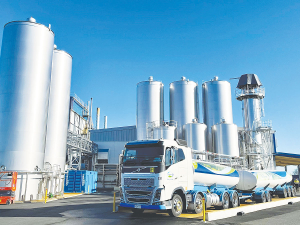Battle for milk
OPINION: Fonterra may be on the verge of selling its consumer business in New Zealand, but the co-operative is not keen on giving any ground to its competitors in the country.
 Fonterra will spend $700 million to improve its manufacturing operations and supply chain emissions footprint.
Fonterra will spend $700 million to improve its manufacturing operations and supply chain emissions footprint.
Fonterra is splashing out $700 million to improve its manufacturing operations and supply chain emissions footprint.
The cc-operative has come out with a new Scope 1&2 emissions reduction target which it says will be achieved by bringing forward some of its work to get out of coal. The Government will chip in $90m.
Fonterra chief executive Miles Hurrell says the co-op is targeting a 50% absolute reduction in Scope 1&2 emissions by 2030, from a 2018 baseline, an increase on its previous target of a 30% reduction by 2030.
“Fonterra’s Scope 1&2 emissions largely come from our manufacturing operations and supply chain. Strengthening our emissions reduction target supports our ambition to be net zero by 2050,” says Hurrell.
Achieving the new target will require Fonterra to continue to undertake energy efficiency improvements and fuel switching to renewable energy source activities across its milk collection fleet and manufacturing sites, with a focus on the six where it uses coal.
To do this, Fonterra is forecasting an investment of $790 million, including a government contribution of up to $90 million through the Government Investment in Decarbonising Industry (GIDI) fund.
Hurrell says as a co-op, Fonterra understands how it can achieve more by working together.
“The addition of Government funding enables us to lift our 2030 ambition to reduce Scope 1&2 emissions by 50% and optimise our process to get out of coal by 2037.
“Our decarbonisation plan will see us explore multiple technologies to ensure the most efficient phase out of coal and transition to renewable energy across our manufacturing sites, while building resilience into our operations.
“We are already well underway with shifting our manufacturing operations to renewable energy sources. Over the past five years, we have carried out decarbonisation projects at five different sites and we’re looking forward to continuing this momentum.
“We’re currently assessing biomass, electrification and heat pump technology at our Clandeboye and Edendale sites. We see these technologies as the best solutions possible at this stage.
“Accelerating our plans will help Fonterra continue to present our customers with the world’s lowest carbon dairy at scale. It will also contribute to New Zealand meeting its climate targets while delivering benefits across regional New Zealand, such as job opportunities in local communities,” says Hurrell.
The co-op is currently talking with farmers about a Scope 3 emissions target, which will be announced shortly.
The World Wide Sires National All Day Breeds Best Youth Camp Best All Rounder plaudit has become family affair, with 2026 Paramount Cup winner Holly Williams following in her sister Zara's footsteps.
DairyNZ is giving New Zealand farmers a unique opportunity to gain hands-on governance and leadership experience within the dairy sector.
Herd improvement company LIC has posted a 5.2% lift in half-year revenue, thanks to increasing demand for genetics.
According to the latest Fresh Produce Trend Report from United Fresh, 2026 will be a year where fruit and vegetables are shaped by cost pressures, rapid digital adoption, and a renewed focus on wellbeing at home.
The Roar is a highlight of the game hunting calendar in New Zealand, with thousands of hunters set to head for the hills to hunt male stags during March and April.
OPINION: The past few weeks have been tough on farms across the North Island: floods and storms have caused damage and disruption to families and businesses.
OPINION: Fonterra may be on the verge of selling its consumer business in New Zealand, but the co-operative is not…
OPINION: What does the birth rate in China have to do with stock trading? Just ask a2 Milk Company.